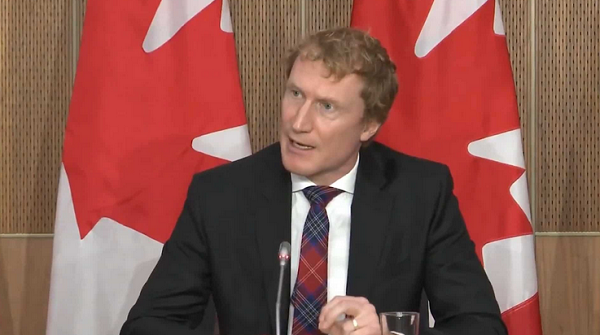Senate committee considering Canada’s temporary foreign workers program
Each year, Canada relies on tens of thousands of temporary foreign workers to harvest our fruits and vegetables, package our meat and process our seafood, among many other things.
They come here from countries like Jamaica, Guatemala, Mexico and the Philippines, often paid minimum wage for their labour.
In 2022, there were just under 205,000 temporary residents with work permits in Canada through the country’s temporary foreign worker program, according to figures from the federal government
While these workers represented just one per cent of the country’s labour force, they filled in key labour gaps that Canadian citizens and permanent residents typically avoid in areas like agriculture, trucking, home childcare and food processing.
Now, as Canada increasingly relies on these workers , a Senate committee is studying the country’s temporary foreign worker program to examine how well it’s operating and areas for improvement. It also comes as a United Nations expert denounced the program, calling it “breeding grounds for contemporary forms of slavery.”(opens in a new tab)
“Over the course of the last couple of years, we have heard various concerns about temporary foreign workers and there is an interest in our committee to address these concerns,” Sen. Stan Kutcher said in a recent interview with CTVNews.ca.
“So we undertook the study to actually learn about the program to see if the program was meeting the needs that it was initially designed to do, or whether those need to change, if the programs needed to be revised.”
COMMITTEE EXAMINING EXPERIENCES OF WORKERS
The study has been in the works for months. Senators have been taking a “thorough” look at all aspects of the program, Kutcher said, including the experiences of temporary foreign workers themselves, their employers and the communities that host them.
Earlier this month, senators visited rural communities in New Brunswick and Prince Edward Island on a “fact-finding mission” to learn more about the temporary foreign worker program.
Kutcher said they visited apple orchards, dairy farms and fish plants and had the chance to speak with the temporary foreign workers there, their employers and local politicians, along with community settlement agencies and non-governmental organizations supporting the workers.
So far, he said the committee has heard “mixed reviews” about the temporary foreign worker program, which the senators are trying to get a better understanding of in order to come up with recommendations for the program moving forward.
In some cases, he said migrant workers reported “great difficulties” in their living and working conditions, whereas in others, migrant workers had “very positive things” to say about their employers and their living and working conditions.
“The program, which is now many, many years old, is probably in need of a critical rethink in order to ensure that the rights of temporary foreign workers that come to Canada are respected and adhered to—that the working conditions are appropriate and meet Canadian standards,” he added.
In a news release Wednesday , Employment and Social Development Canada (ESDC) said the federal department completed more than 2,100 inspections of workplaces that hosted temporary foreign workers last fiscal year, finding 94 per cent of the employers were compliant with the conditions of the program.
From April 1, 2022, to March 31, 2023, ESDC said 116 employers were found non-compliant with the temporary foreign worker program and were either fined, issued a warning or banned from using the program for up to five years.
The violations included failing to provide adequate wages, adequate accommodations and safe working conditions.
WORKERS’ VOICES MUST BE PRIORITIZED: ADVOCATE
Since its inception in 1973, Canada’s temporary foreign worker program has been scrutinized by numerous politicians, advocates, academics and workers themselves, highlighting the important role temporary foreign workers have played in addressing labour gaps while bringing to light some of the abuses they have faced in this country.
Earlier this month, a UN expert called Canada’s temporary foreign worker programs “a breeding ground for contemporary forms of slavery,” urging the country to do more to protect workers and offer a clear pathway to permanent residency for all migrants
“I am deeply disturbed by the accounts of exploitation and abuse shared with me by migrant workers,” said Tomoya Obokata, UN Special Rapporteur on contemporary forms of slavery, in a statement at the end of a 14-day visit to the country.
Obokata said employer-specific work permit regimes, including certain temporary foreign worker programs, make migrant workers “vulnerable to contemporary forms of slavery, as they cannot report abuses without fear of deportation.”
When asked about the UN envoy’s comments, Kutcher said he believes people should be “very careful” about the language they use and that the Senate study is exploring permanent residency for migrant workers as a possible solution.
“People have to ensure that when they look at something as complex and as varied as this program, that they take the time to understand it in its entirety and in its complexities, and that’s what the Senate committee is doing,” he said.
Syed Hussan, the executive director of Migrant Workers Alliance for Change, a national migrant network that boasts roughly 40,000 members, has long been calling for permanent resident status for all migrants.
He said Obkota is part of “a long line of people” who have said permanent resident status is the solution for resolving the issues of temporary foreign workers, which include not having access to public healthcare and at times being exploited and underpaid by employers.
“The only solution is permanent resident status. So long as workers don’t have the ability to protect themselves, they face eviction, deportation, homelessness, simply for speaking up,” Hussan, who was consulted for the Senate study, told CTVNews.ca.
“And we can’t have a fair society without equality, and equality is not possible with so many people who don’t have permanent immigration status.”
When asked what he hopes comes from the Senate study, Hussan said officials “need to make sure that the workers’ voices are the ones that are guiding the decisions.”
Anna Triandafyllidou, the Canada Excellence Research Chair in Migration and Integration at Toronto Metropolitan University, was also consulted by the Senate committee for the study.
Triandafyllidou said she ultimately believes the country needs to look at where labour gaps exist and whether they can be filled with permanent residents moving forward, noting that there are many other people in Canada here with temporary work permits, beyond those working in agriculture, that should also be taken into account as part of this conversation.
“There’s no reason for bringing people as temporary workers if they can be brought in as permanent residents,” Triandafyllidou said.
“I mean, I think this is the philosophy of Canada from the beginning of time. We want citizens, we don’t want to use and abuse the temporary labour force and then send people away.”


FEDS ‘CLOSELY MONITORING’ SENATE’S WORK
The Senate committee’s study and its recommendations will be released in the coming months, Kutcher said.
In a written statement, ESDC told CTVNews.ca that the federal government “places a high priority” on ensuring the health, safety and protection of temporary foreign workers during their stay in Canada.
“The department has been closely monitoring the work of the committee and looks forward to participating in discussions on various issues, including worker protections,” it added.
A spokesperson for Immigration, Refugees and Citizenship Canada said the federal immigration department is collaborating with the Senate committee on its study of Canada’s temporary foreign worker program.
“It would be inappropriate to comment at this time considering the study is ongoing,” the spokesperson said.
This article was reported by CTV News












